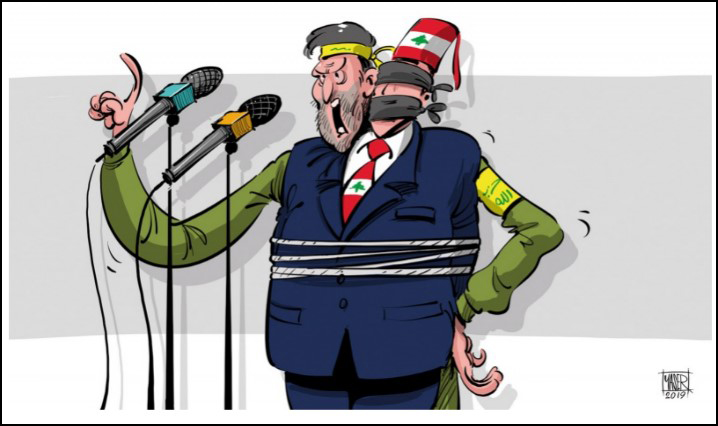As U.S. Secretary Of State Pompeo Prepares To Visit Lebanon, Hizbullah Is In Complete Control Of Lebanese Government – And The March 14 Camp, Saudi Arabia, And U.S. Have Cooperated With It And Come To Terms With The Situation
سي جاكوب/موقع ميمري: بومبيو يزور لبنان في حين أن حزب الله يسطر عليه بالكامل فيما تجمع 14 آذار والسعودية وأميركا تعاونوا مع الحزب وتقبلوا الوضع القائم
By: C. Jacob/MEMRI/March 21/19
Introduction
On January 31, 2019, a most significant event occurred in Lebanon. Nine months after the parliamentary elections, a new government emerged, in which Hizbullah and its allies hold a large majority, following political struggles from within as well as struggles for influence from outside the country between the axis headed by Saudi Arabia and the axis headed by Iran.[1] Of the 30 government ministerial posts, four of them held by women, Hizbullah and its allies hold 18 – with three being held by Hizbullah itself, including the important Health Ministry portfolio, in spite of strong U.S. opposition to this. Another vital portfolio, that of the Ministry of Displaced Persons through which Syria seeks to revive its influence in Lebanon, is held by Hizbullah allies.
Lebanese Prime Minister Sa’d Al-Hariri and the March 14 camp have come to terms with this historic political turn, and are cooperating; they now hold 11 portfolios.
It should be noted that although Hizbullah holds only three portfolios, together with its allies it forms a large majority in the government, and has taken political control of the country.
Once the government was formed, members of the March 14 camp feared that it would act to circumvent the sanctions on Iran and Hizbullah – which would be met with a harsh response against Lebanon from the U.S. They are presenting Lebanon as a country that has lost its sovereignty to Hizbullah and its allies, who, they argue, now control it through Hizbullah’s weapons and the support it receives from Iran.
In Saudi Arabia, too, concern has been expressed about the composition of the new Lebanese government. However, even as the Saudi press is harshly critical of this, and particularly of the “terrorist Hizbullah” force within it, official Saudi elements have welcomed the government.
The U.S. has expressed its antipathy to Hizbullah’s growing political strength, but it is doubtful whether it will take any steps against Hizbullah. Before the new government emerged, the U.S. clearly stated its vehement opposition to Hizbullah receiving the health portfolio – but no political element in Lebanon was able to prevent that. The U.S. will apparently not be able to monitor or thwart the transfer of Lebanese government funds to Hizbullah. It has said in the past that it will continue to support Lebanon because it seeks to strengthen the country’s official government – but now the official government is controlled by Hizbullah, which is also now in charge of the Lebanese Army because the defense minister is close to Hizbullah.
Hizbullah’s influence in Lebanon grows (source: Al-Arab, London, March 12, 2019)
It should be noted that in taking over the government by democratic means, Hizbullah has taken a moderate approach, and has turned its political energy to the issue of fighting corruption, for which there is a countrywide consensus. Hizbullah Secretary-General Hassan Nasrallah himself has ranked fighting corruption as high in importance as fighting Israel.
This report reviews Hizbullah’s growing political might in its takeover of power in Lebanon.
Hizbullah’s Military Control In Lebanon And Its Expansion Outside its Borders.
For many years, Hizbullah has been perceived as the most powerful military force in Lebanon, and its status was further strengthened when it took credit for the Israeli army’s exit from Lebanon in 2000, and its subsequent exit following the 2006 Second Lebanon War, when Nasrallah declared that he had attained victory over Israel. Hizbullah’s might is demonstrated by its deterrent power of more than 120,000 missiles, whose launch would cause great damage to Israel even if it led to Lebanon’s complete destruction. Additionally, Hizbullah continues to receive weapons from Iran; it is involved in military clashes in Syria; it is preparing a front for fighting Israel on the Golan Heights; and it is maintaining military cooperation with the Houthis in Yemen[2] and the Polisario Front in the Sahara.[3] Its digging of tunnels at the Lebanon-Israel border shows that it has no qualms about challenging the Lebanese military and embarrassing Lebanon’s leaders by blatantly violating UN Security Council Resolution 1701, which brought the Second Lebanon War to an agreed-upon end.[4]
Hizbullah’s Political Achievements On The Path To Taking Over The Government By Democratic Means
Since Hizbullah entered Lebanese political life, it has been clear that it is not going to be satisfied with military hegemony in Lebanon, but is also striving to control all areas of life in the country. A clear manifestation of this is the fact that it was Hizbullah that determined that Michel Aoun would be president. Prior to the May 2018 parliamentary elections, Hizbullah worked to change the electoral system so as to increase its political might – a move that contributed to its and its allies’ win of a large majority in parliament.
The distribution of portfolios has given the March 8 Alliance – which includes Hizbullah, the Shi’ite Amal movement, and the Free Patriotic Movement faction of President Aoun and Foreign Minister Gibran Bassil – a distinct advantage. The Alliance has 18 portfolios – including three for Hizbullah and three for Amal – as opposed to 11 for the pro-Saudi March 14 camp, which includes Prime Minister Al-Hariri’s Al-Mustaqbal faction, Samir Geagea’s Lebanese Forces party, which is Christian, and the Progressive Socialist Party of Walid Jumblatt, leader of Lebanon’s Druze. One minister, a woman, was appointed in an agreement between Al-Hariri and Bassil.
The March 8 Alliance’s most important achievement is its control of more than a third of the government ministries, with 11 ministers – more than the required third, thus allowing it to veto any resolution it wants. Furthermore, even within the coalition, Hizbullah is in control, since its allies, Aoun and Bassil, will need Hizbullah’s agreement to reject any unwanted resolution – since two of the 11 ministers are pro-Syria and cannot be counted on to vote with Bassil and Aoun against a Hizbullah position.
Another notable Hizbullah accomplishment is the high value of the portfolios it holds. Despite U.S. objections, it was given the large-budget health portfolio, and the Health Ministry is headed by Jamil Jabaq, formerly Nasrallah’s personal physician. Yet another achievement was the appointment of Elias Bou Saab as defense minister – who has been criticized as “identifying with Hizbullah”[5] – and the Displaced Persons portfolio being handed to a pro-Syria minister. Hizbullah and its allies advocate allowing the displaced to return home to Syria without making their return conditional upon a political solution for that country, with close Lebanese cooperation with the Assad regime in Syria, while March 14 elements are demanding a political solution before they return home, and have reservations regarding Syria’s attempts to revive its influence in Lebanon by leveraging the issue of the displaced persons. Some members of the March 14 Alliance have explained that their reservations have to do with normalizing relations with Syria in light of its murderous regime, and in light of the fact that Syria has labeled Lebanese leaders, among them Prime Minister Al-Hariri, as terrorists.[6]
In the period between the May 4, 2018 parliamentary elections and the establishment of the government on January 31, 2019, Hizbullah worked in a moderate and consistent manner to further its objectives. First, the organization sat on the fence and observed how its ally Gibran Bassil worked to hobble the Lebanese Forces party and to weaken Jumblatt’s influence, who was forced to cede one of the three portfolios earmarked for him and hand it to another Druze representative, who is close to Talal Arslan, his rival for the Druze community’s leadership.
When it appeared that most of the disagreements in the coalition negotiations had been resolved, Hizbullah suddenly took action and supported the demand of the Sunni MPs from the March 8 Alliance that they should receive a portfolio, despite then-Interim Prime Minister Sa’d Al-Hariri opposition to relinquishing his position as the sole representative of the Sunnis. With this move, Hizbullah managed to further erode Al-Hariri’s status as representative of the Sunnis, by forcing on him a Sunni minister from the pro-Syria March 8 Alliance – thus making sure that nothing can happen in Lebanon without its consent.
March 14 Alliance, Saudi Arabia Have Come to Terms With The Establishment Of The Government
While criticism and concern have been voiced by the March 14 Alliance and the Saudi press about the composition of the new government, this is of no significance, because they have come to terms with it and with the fact that Hizbullah and its allies now hold political control of Lebanon. Their criticism focused on the following:[7]
1-Iran’s influence – Hizbullah has traded the Israeli “occupation” for an Iranian-Syrian occupation.
2-The legitimization of Hizbullah’s weapons and its anticipated takeover of the military.
3-The fact that Hizbullah’s digging of tunnels is likely to lead to a war with Israel.
4-Helping Iran circumvent the U.S. sanctions, and thus putting Lebanon’s economy at risk, since Lebanon too may also become a target of sanctions.
In Advance Of U.S. Secretary Of State Pompeo’s Visit: How Will The U.S. Act Towards Lebanon?
In the face of Iran’s influence in Lebanon, the U.S. has stepped up its activity, and U.S. administration representatives have paid recent visits in an attempt to reduce Iran’s involvement in providing aid to Lebanon. These representatives have announced that the U.S. is supplying precision weapons to the Lebanese army and stressed that it will continue to support it.[8] U.S. Assistant Secretary of State for Near Eastern Affairs David Satterfield urged Lebanon to set an independent policy not dictated by foreign elements that would serve only its own interests.[9] He clarified that the U.S. would continue to pressure Iran to withdraw its forces and Hizbullah forces from Syria, and also said that the U.S. would be following the government’s actions and decisions to ensure that they serve Lebanon’s interests and are not influenced by Hizbullah, behind which stands Iran, and also to ensure that Hizbullah does not take advantage of its membership in the government to circumvent the sanctions imposed on it. However, his statements have no practical significance.[10]
With respect to U.S. Secretary of State Mike Pompeo’s upcoming visit to Lebanon, it is likely that he will pressure the new Lebanese government not to bow to Hizbullah’s dictates, while at the same time announcing that the U.S. will continue its policy of providing aid to the Lebanese army. In this way, he will complete Hizbullah’s and Iran’s control of Lebanon and will even be collaborating with Hizbullah on the practical and political levels – regardless of the fact that Hizbullah has been a U.S.-designated Foreign Terrorist Organization since 1997.[11]
*C. Jacob is a Research Fellow at MEMRI.
[5] Eliasbejjaninews.com, February 4, 2019.
[6] Elnashra.com, February 4, 2019; Al-Akhbar (Lebanon), February 1, 2019.
[9] Aswsat.com, March 6, 2019.
[10] Alhayat.com, March 7, 2019.
https://www.memri.org/reports/us-secretary-state-pompeo-prepares-visit-lebanon-hizbullah-complete-control-lebanese#_ednref5





















